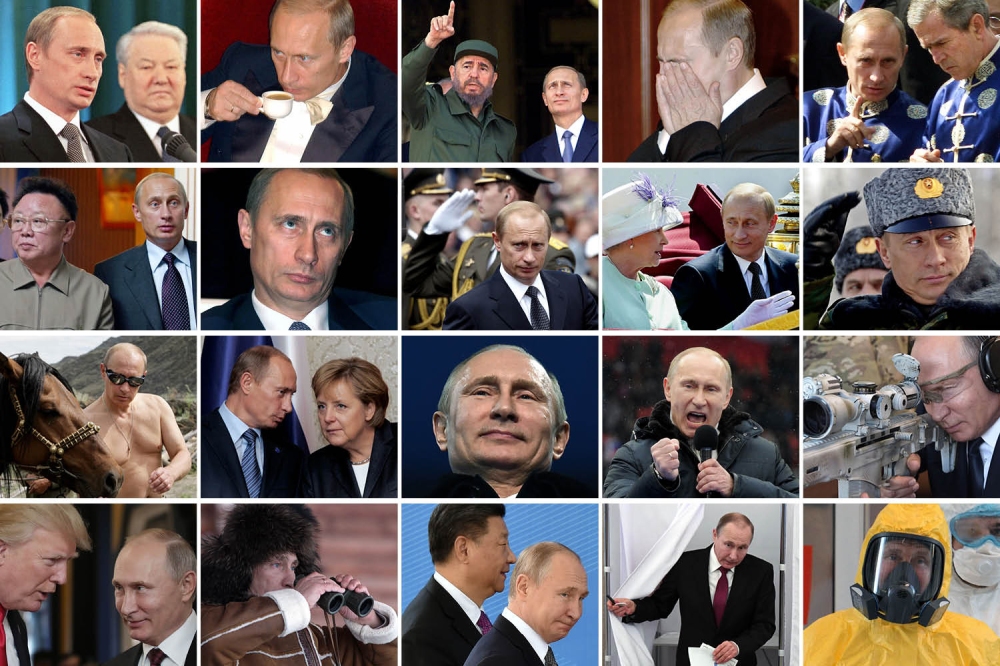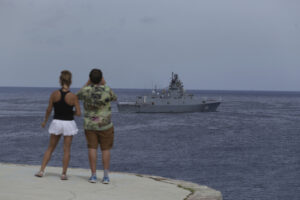Putin May Not be Crazy
Although the barrage of news coverage surrounding the Russia-Ukraine war tends to describe the conflict as “unprecedented” and “with no historical parallel,” the underlying interests and tensions that drove Vladimir Putin to invade Ukraine are by no means new.

Image Credit: Foreign Policy
Disclaimer: Russia’s invasion of Ukraine is an ongoing conflict and this op-ed may not reflect the most recent updates.
Although the barrage of news coverage surrounding the Russia-Ukraine war tends to describe the conflict as “unprecedented” and “with no historical parallel,” the underlying interests and tensions that drove Vladimir Putin to invade Ukraine are by no means new. And while it is certainly true that the conflict has changed and escalated substantially in the last couple of weeks, both Russian and Western leadership have been laying the groundwork for this conflict for years.
I do not mean to downplay the severity of Putin’s actions, as the recent developments are horrifying and will certainly have detrimental consequences that the international community will feel for decades to come. However, writing off Putin as a crazy, irrational, power-hungry egomaniac is a mistake. The West has played a role in this most recent show of Russian aggression over Ukraine, and should understand the motives behind Putin’s actions. Putin is simply acting strategically to protect his perception of Russia’s interests, even if the strategy itself is risky and costly. As such, a keen observer could have predicted this outcome years ago – and he did.
In 2014, leading International Relations scholar John Mearsheimer, a professor of political science at the University of Chicago, published a controversial article titled “Why the Ukraine Crisis Is the West’s Fault.” I read this article years ago, but reading it in 2022 is striking for its applicability today.
The current Russia-Ukraine war stems from Putin’s dissatisfaction with the international order.
The current Russia-Ukraine war is a continuation of the conflict that first erupted in 2014, and stems from Putin’s dissatisfaction with the international order cemented by the United States at the close of the Cold War.
Russian leadership has expressed adamant opposition to the expansion of the North Atlantic Treaty Organization (NATO) since its formation, but Russia was initially too weak to act decisively against NATO’s continued expansions after the collapse of the Soviet Union. When NATO expanded right up to Russian borders during its April 2008 summit, formally endorsing Georgia and Ukraine as future members of NATO, Putin stated that NATO was directly threatening Russian strategic interests and warned of the consequences.
That same year, in 2008, the European Union (EU) announced its Eastern Partnership initiative, a program dedicated to the integration of countries such as Ukraine into the EU economy. There were also active efforts to promote democracy in Ukraine and other post-Soviet states, with the US investing more than $5 billion between 1991-2013 to enable Ukraine to build “the future it deserves.”
Mearshimer argues in his article, therefore, that it should surprise no one that Russia moved to take Crimea from Ukraine after the Ukranian government collapsed in 2014. After all, the previously pro-Russian government was replaced by a pro-Western and anti-Russian government, and there was proven US involvement in the regime change. Putin viewed this as a coup, and this necessitated strong action against Ukrainian integration into the West.
Putin has been warning the West against their eastward expansion for decades, binding himself to a commitment against NATO, the EU, and the Western strategy of democratic expansion at large. If he did not act decisively against the threat of the indoctrination of Ukraine into the West, he would appear weak and lose credibility as a leader.
Furthermore, while it is impossible to know Putin’s true intentions, in drawing a line in the sand against Western expansion, Putin has been laying a rhetoric groundwork that justifies his stance and actions towards Ukraine. Regardless of whether or not the West is actually to blame, Western expansionist policies have inherently played into the development of this narrative by Putin. This has helped divide opinion in the West, and has been used as a propaganda tool in Russia.
Western leaders have underestimated Putin and continued to cling to provocative policies that threaten Russia’s stated national interests.
The West has thus been laying the foundation for the crisis with Russia over Ukraine for decades. Western leaders have underestimated Putin and continued to cling to provocative policies that threaten Russia’s stated national interests. In turn, Putin is responding strategically to the ever growing threat of the West and perceived disrespect from Western leadership. Mearsheimer prompts his readers to put themselves in Putin’s shoes, stating “Imagine the outrage in Washington if China built an impressive military alliance and tried to include Canada and Mexico in it.”
While I do not condone Putin’s actions or policies, and Mearsheimer’s assertions are certainly inflammatory, an understanding of the roots of this conflict and the ways in which it built upon itself over the years is crucial in order to work towards any kind of solution with Russia. The tendency of Western leaders (and their publics) to attribute Putin’s actions to characteristic Russian aggression leads to ignorance of the conflict’s context, Western leadership’s involvement, and Putin’s strategic motivations to wage war.
Putin has been preparing for his chance to take action against Western expansion and the international order set by the US, and he views now as his strategic window of opportunity. Russia is no longer a weakened state with a fledgling military; even since 2014 Putin has greatly improved Russia’s armed forces, “adding everything from hypersonic missile capabilities to advanced cyberwarfare tools.”
Putin also initiated this war knowing that the US and its allies would be limited in their capabilities to respond and counteract, with economic sanctions and the provision of arms as their main options for deterrence. And he was right – so far. The Western response has been ineffectual in deterring Putin because they are geo-politically constrained to those strategies. Despite the severity of the sanctions the West has placed on Russia, from the US banning Russian oil imports to Germany freezing the Nord Stream 2 project, Putin seems undeterred because he prepared for this. Over the last several years, Putin built up Russian currency reserves, cut government budgets, and restructured Russia’s economy to reduce Western ties and influence. Indeed, history shows that “countries will absorb enormous amounts of punishment in order to protect their core strategic interests.”
So while the war started only a couple of weeks ago, it appears the West is already running out of options to de-escalate the situation, and some kind of “unpleasant compromise” is seeming more and more likely.
Concessions may therefore be necessary that could have been made years ago, without a full-scale confrontation creating millions of refugees.
Concessions may therefore be necessary that could have been made years ago, without a full-scale confrontation creating millions of refugees. This could include Ukraine categorically stating that it will not join NATO, or Ukrainians relinquishing the territory already seized by Russian troops. This is of course not the preferred course of action for the West or Ukraine, but it may be one of the last remaining options to avoid a long, drawn-out war. And this may prove to have been Putin’s goal all along.
These kinds of bold military actions have worked in Putin’s favor in the past, and the ease with which he took Crimea in 2014 emboldened him. In fact, “Putin’s past three wars are textbook examples of how to use military force in limited ways to achieve political goals.”
World leaders who stand in opposition to Putin now must evaluate how and why Putin is rationalizing such aggressive action, and consider their own role in shaping Putin’s strategic interests as well. Unfortunately, as Mearsheimer stated in a recent interview for the New Yorker, strategically wise policy is often morally wrong policy. Until Western leadership comes to terms with the fact that Putin’s invasion of Ukraine has strategic strengths despite its moral dimensions, they will be unable to make sense of Putin’s actions and any efforts at deterrence will be unsuccessful. In order to predict and prepare for Putin’s next “crazy” and “unprecedented” move, the West must stop underestimating his geo-political approach and view the war through Putin’s strategic lens.
Liana Almony (she/her) served as the former Deputy Editor-in-Chief for JPI Online Magazine. In 2023, she successfully earned her Master’s Degree in International Relations from NYU. Prior to that, Liana accomplished her academic pursuits at the University of California Los Angeles, where she completed her bachelor’s degree in Political Science with a concentration in International Relations, along with double minors in Global Studies and Digital Media Studies, graduating in 2019. Her remarkable journey doesn’t end there; Liana’s professional experience includes valuable contributions at The Wilson Center and Cause Communications. Her adeptness in media management, particularly within the nonprofit sector, allows her to actively champion human rights and social justice causes on a global scale. Beyond her professional endeavors, Liana finds joy in her passions outside of work. Among them are boxing, photography, and exploring the diverse and captivating NYC restaurant scene.




